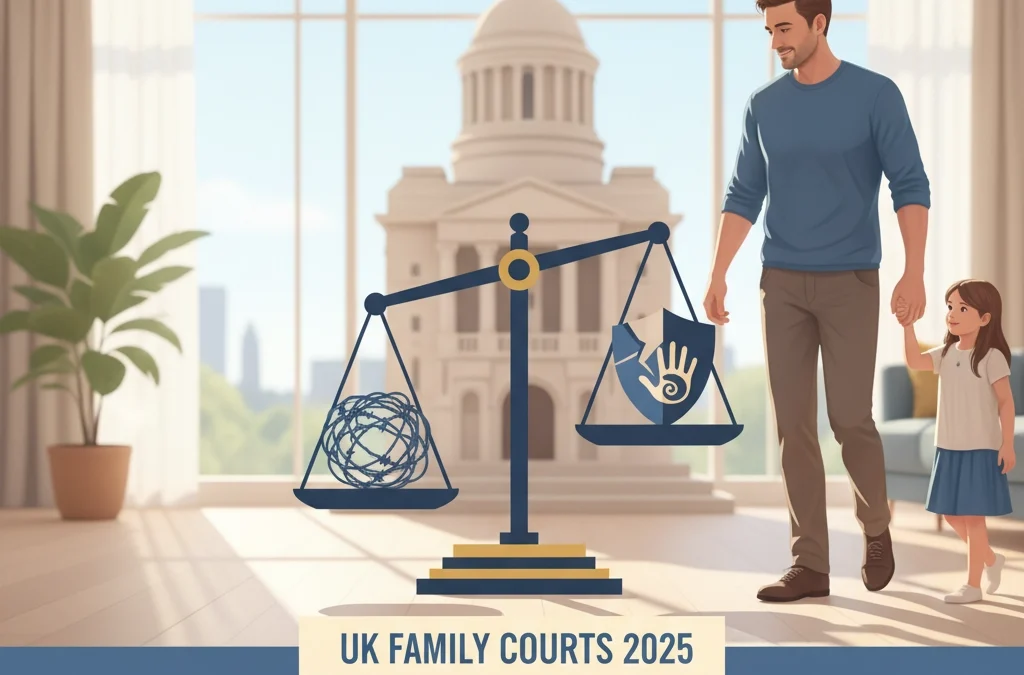Fathers United. Rights Respected. The landscape of UK family courts has shifted dramatically in 2025, and every dad fighting for his children needs to understand these game-changing developments. If you're facing competing allegations of parental alienation versus domestic abuse, the rules have fundamentally changed: and not necessarily in your favour.
We're not here to sugarcoat the reality. The Family Justice Council has issued new guidance that creates a clear hierarchy: domestic abuse allegations now take absolute precedence over parental alienation claims. This means that when your ex makes abuse allegations while you're trying to prove parental alienation, the courts will prioritise her claims first.
The New Reality: Domestic Abuse Claims Win
Let's cut through the legal jargon and give you the brutal truth. The updated guidance establishes what amounts to a presumption in favour of domestic abuse allegations. Courts must now treat these claims as primary concerns that supersede any parental alienation arguments you might present.
Here's what this means for you as a father:
- Your parental alienation claims face significantly higher scrutiny
- Domestic abuse allegations get fast-tracked consideration
- Courts view abuse claims as "criminal offenses with recognised harm"
- Parental alienation requires you to meet a much tougher evidential burden

Every Dad Matters, and understanding this shift is crucial to protecting your relationship with your children. The guidance explicitly labels "parental alienation syndrome" as "harmful pseudoscience" that lacks supporting evidence. This dismissive language signals how seriously courts now take these competing claims.
The Three-Part Test That Could Break Your Case
Before courts will even consider your parental alienation claims, you must now satisfy a rigorous three-part test. Fail any element, and your case collapses:
Part One: Prove the Child's Reluctance
You need clear, documented evidence that your child is reluctant, resistant, or refusing to engage with you. This isn't just about missed contact sessions: you need professional input from Cafcass or social workers demonstrating the child's views.
Part Two: Establish Causal Connection
The toughest hurdle: proving the child's reluctance stems directly from your ex's actions. Courts will actively consider whether any "abusive behaviours" on your part might justify your ex's "protective behaviours."
Part Three: Evidence of Psychological Manipulation
You must provide concrete proof of deliberate psychological manipulation by your ex that directly impacted your child. Vague claims won't cut it: you need a clear, demonstrable link between her actions and your child's behaviour.
What No Longer Counts as Parental Alienation
The guidance has created significant protected categories of behaviour that courts will never classify as parental alienation, no matter how frustrated you feel:
Protective Behaviours: If courts find your ex was shielding your child from genuine harm, her actions cannot constitute alienating behaviour: even if they damage your relationship.
Justified Rejection: When children develop negative feelings about you based on court findings of domestic abuse, this is considered reasonable rather than manufactured alienation.
Natural Alignment: Children forming preferences based on their own conclusions about harmful parenting: including neglect or exposure to abuse: falls outside parental alienation definitions.
Unexplained Reluctance: Even when there's no obvious cause for your child's reluctance to see you, courts won't automatically assume parental alienation.

The Expert Game Has Changed
One crucial shift affects how courts handle psychological evidence. Experts can no longer determine whether parental alienation has occurred: that's now exclusively the court's responsibility. Psychologists can only advise on handling confirmed alienation cases.
This change strips away one potential avenue for establishing your case through expert testimony. You're now entirely dependent on convincing judges directly, without professional psychological backing.
Fighting Back: Your Practical Strategy
Don't despair: Fathers United. Rights Respected. means we equip you with realistic strategies for this challenging landscape:
Document Everything Meticulously
- Record all missed contact sessions with dates, times, and circumstances
- Screenshot social media posts, messages, and communications
- Keep detailed logs of your child's statements and behaviour changes
- Gather witness statements from teachers, relatives, and family friends
Build Your Character Evidence
- Demonstrate consistent, appropriate parenting behaviours
- Show your positive involvement in your child's education and activities
- Maintain all court orders and requirements without exception
- Avoid any actions that could be construed as controlling or aggressive
Challenge False Allegations Systematically
- Respond to every domestic abuse allegation with specific counter-evidence
- Present timeline inconsistencies in your ex's claims
- Highlight any patterns of false reporting to authorities
- Gather evidence of your ex's alienating behaviours before the abuse allegations emerged

The Numbers Game: Why Courts Favour Abuse Claims
Research shows that over half of private law children cases now involve both domestic abuse and parental alienation allegations. Courts face impossible choices between competing narratives, and the new guidance resolves this tension by creating a clear hierarchy.
Domestic abuse allegations carry several advantages:
- Lower evidential threshold for initial acceptance
- Access to legal aid and specialist support
- Presumption of protective intent behind seemingly alienating behaviours
- Criminal law backing that gives claims additional weight
Parental alienation claims face systematic disadvantages:
- High evidential bar requiring psychological manipulation proof
- No legal aid support for pursuing these claims
- Courts' skepticism about the concept's scientific validity
- Easy dismissal as litigation tactics rather than genuine concerns
Your Rights Still Matter: Here's How to Protect Them
Every Dad Matters, and despite these challenging changes, you still have rights worth fighting for. The key lies in adapting your approach to the new reality:
Focus on Child Welfare Evidence
- Demonstrate how contact serves your child's best interests
- Present evidence of the positive relationship you previously enjoyed
- Show your child's developmental and emotional needs that you specifically meet
- Highlight any negative impacts of contact restrictions on your child
Address Abuse Allegations Head-On
- Never ignore or minimise domestic abuse claims
- Provide detailed, specific responses to each allegation
- Present evidence of your positive relationship patterns
- Consider domestic abuse perpetrator programs if recommended by courts
Seek Professional Support
Working with experienced family law professionals becomes even more crucial under the new guidance. Consider visiting our legal aid resources to understand your options.

The Long-Term Outlook
The Family Justice Council's guidance represents more than procedural changes: it reflects a fundamental shift in how society views fathers' rights versus protection concerns. While challenging, this creates opportunities for fathers who can demonstrate genuine, appropriate parenting relationships.
Key adaptation strategies include:
- Building stronger evidence bases for your claims
- Working collaboratively with professionals when possible
- Focusing on child welfare rather than adversarial positioning
- Accepting that parental alienation findings will be rare but still possible
Your Call to Action
Fathers United. Rights Respected. This isn't just our slogan: it's your reminder that collective action and proper preparation can overcome even hostile legal environments. The 2025 changes make your fight harder, but not impossible.
Ready to strengthen your case? Join our community of fathers navigating these challenging waters. Share your experiences, learn from others, and access practical resources designed specifically for the new legal landscape.
Every Dad Matters: including you. Don't let procedural changes deny your children the father-child relationship they deserve. Stand with us, fight smart, and never give up on your rights as a father.

Ready to take action? Contact Fathers Rights today for guidance tailored to the 2025 legal landscape. Together, we're building a stronger future for fathers and children across the UK.

